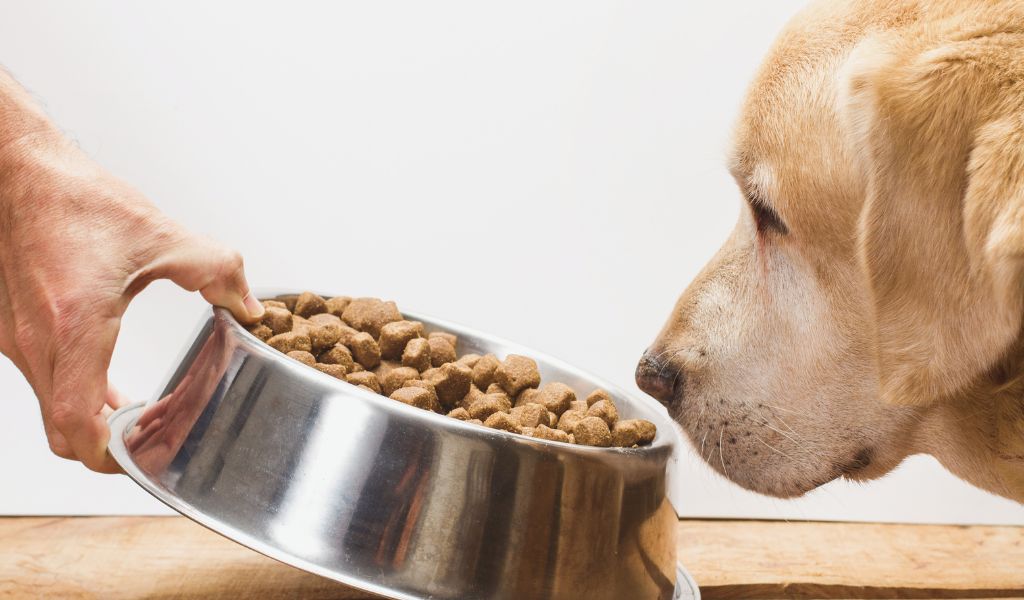There is no definitive answer to this. Dogs differ in their expectations and when you feed them will depend upon what they have become used to and when your schedule permits. The most important thing is to feed a nutritionally balanced meal at a similar time daily that meets your dog’s needs.
When it comes to feeding our furry friends, it’s important to establish a regular feeding schedule that meets their nutritional needs.
One common question that dog owners often ask is, “Should dogs eat more in the morning or evening?”
Finding the right answer to this question is crucial to ensuring the well-being of our beloved pets. In this article, we will explore the benefits and considerations of feeding dogs in the morning and evening, and provide expert advice on the best approach.
Feeding Dogs in the Morning
Feeding dogs in the morning has its advantages. Let’s take a closer look at why a morning feeding routine may be beneficial for your four-legged friend.
Energy Boost for the Day
Just like humans, dogs need a good start to the day.
By feeding them in the morning, you provide them with the necessary energy to tackle their daily activities. It helps to kickstart their metabolism and maintain their energy levels throughout the day.
Preventing Hunger Pangs
Feeding your dog in the morning helps prevent hunger pangs that can lead to discomfort and excessive begging.
By giving them a nutritious meal early in the day, you ensure that they are satisfied and less likely to search for food or become anxious due to hunger.
Promoting Consistency
Establishing a regular feeding routine is essential for your dog’s overall well-being.
Feeding them in the morning sets a consistent pattern that they can rely on, creating a sense of security and predictability. It also helps regulate their bathroom habits, making it easier for both of you to maintain a schedule.
Optimal Digestion
Feeding dogs in the morning allows them ample time to digest their food before their activity levels decrease in the evening.
This can help prevent digestive issues such as bloating or indigestion, as they have more time to process the nutrients and eliminate waste.
Feeding Dogs in the Evening
While a morning feeding routine has its benefits, feeding dogs in the evening also has its advantages. Let’s explore why an evening feeding routine may be suitable for your furry companion.
Weight Management
Feeding dogs in the evening can aid in weight management.
As their activity levels decrease towards the end of the day, they are less likely to burn off the calories consumed during dinner. This can help prevent weight gain, especially for dogs who are less active or prone to obesity.
Promoting Relaxation
A full belly in the evening can help promote relaxation and a good night’s sleep for your furry friend.
Just like humans, dogs can feel content and at ease after a satisfying meal. This can be particularly beneficial for dogs who experience anxiety or restlessness during bedtime.
Bonding Time
Feeding your dog in the evening can become a special bonding time for both of you. It allows you to spend quality time together, reinforcing the human-animal bond.
This shared experience can strengthen your relationship and provide a sense of companionship.
Preventing Overnight Hunger
Feeding dogs in the evening ensures that they have a full stomach overnight, reducing the chances of waking up hungry and disrupting their sleep.
By providing them with a balanced meal before bedtime, you help maintain their comfort and well-being throughout the night.
No products found.
Can I feed my dog once a day?
Feeding your dog once a day is generally not recommended. Dogs have higher metabolic rates than humans, and their bodies require a steady supply of nutrients throughout the day. Splitting their meals into two or more servings ensures a more balanced and consistent intake.
How much should I feed my dog?
The amount of food to feed your dog depends on various factors, such as their age, weight, activity level, and overall health. It’s best to consult with your veterinarian to determine the appropriate portion sizes and feeding frequency for your specific dog.
Should I free-feed my dog?
Free-feeding, where food is constantly available, is not recommended for most dogs. It can lead to overeating, weight gain, and a loss of control over their eating habits. Establishing regular meal times helps regulate their intake and promotes healthy eating habits.
Can I change my dog’s feeding schedule?
If you need to change your dog’s feeding schedule, it’s important to do so gradually. Start by shifting their meal times by small increments each day until you reach the desired schedule. Sudden changes can cause digestive upset and discomfort.
What should I do if my dog refuses to eat in the morning?
If your dog refuses to eat in the morning, it’s essential to rule out any underlying health issues by consulting with your veterinarian. Loss of appetite can be a sign of an underlying problem that needs to be addressed promptly.
Is it okay to give my dog treats between meals?
Treats can be a great way to reward and train your dog, but it’s important to moderate their intake. Excessive treats can contribute to weight gain and disrupt the balance of their main meals. Opt for healthy, dog-friendly treats and limit them to occasional indulgences.
Conclusion and final thoughts
Feeding our canine companions in the morning or evening has its own benefits, and the right choice depends on various factors such as their activity level, health condition, and personal preference.
While some dogs thrive on a morning feeding routine, others may prefer an evening schedule.
Ultimately, the most important thing is to ensure that their nutritional needs are met, and they receive a well-balanced diet throughout the day.
Consulting with your veterinarian can help you determine the best feeding schedule for your individual dog.
So, should dogs eat more in the morning or evening? The answer lies in finding what works best for your furry friend’s overall health and well-being.
Last update on 2024-07-27 / Affiliate links / Images from Amazon Product Advertising API





